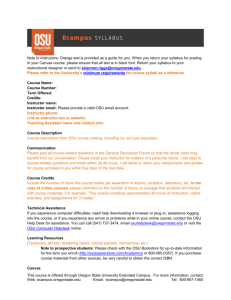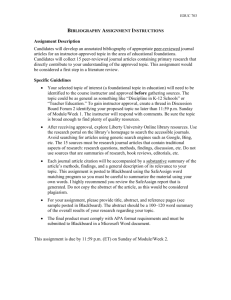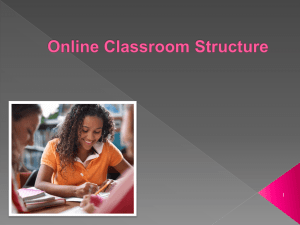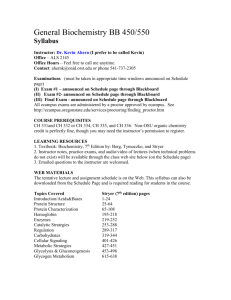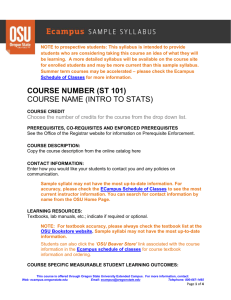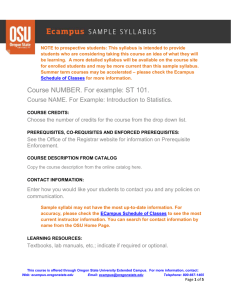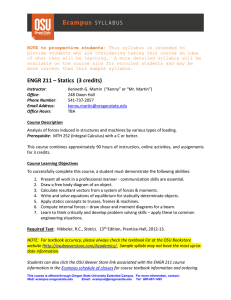Course Name - Oregon State Ecampus
advertisement
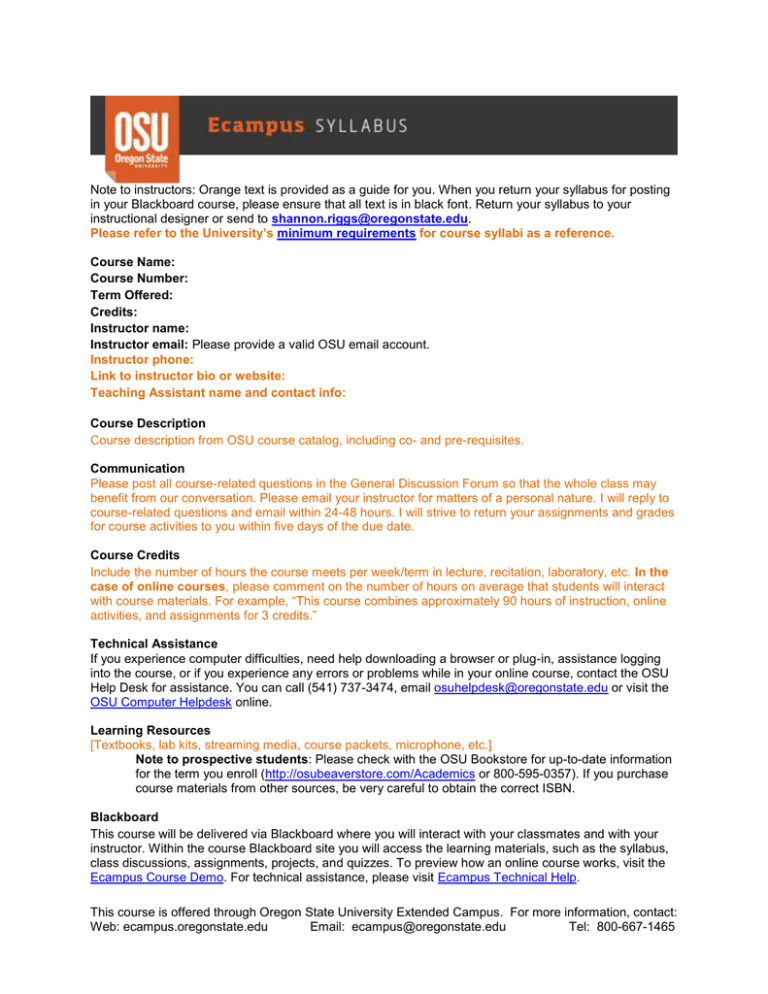
Note to instructors: Orange text is provided as a guide for you. When you return your syllabus for posting in your Blackboard course, please ensure that all text is in black font. Return your syllabus to your instructional designer or send to shannon.riggs@oregonstate.edu. Please refer to the University’s minimum requirements for course syllabi as a reference. Course Name: Course Number: Term Offered: Credits: Instructor name: Instructor email: Please provide a valid OSU email account. Instructor phone: Link to instructor bio or website: Teaching Assistant name and contact info: Course Description Course description from OSU course catalog, including co- and pre-requisites. Communication Please post all course-related questions in the General Discussion Forum so that the whole class may benefit from our conversation. Please email your instructor for matters of a personal nature. I will reply to course-related questions and email within 24-48 hours. I will strive to return your assignments and grades for course activities to you within five days of the due date. Course Credits Include the number of hours the course meets per week/term in lecture, recitation, laboratory, etc. In the case of online courses, please comment on the number of hours on average that students will interact with course materials. For example, “This course combines approximately 90 hours of instruction, online activities, and assignments for 3 credits.” Technical Assistance If you experience computer difficulties, need help downloading a browser or plug-in, assistance logging into the course, or if you experience any errors or problems while in your online course, contact the OSU Help Desk for assistance. You can call (541) 737-3474, email osuhelpdesk@oregonstate.edu or visit the OSU Computer Helpdesk online. Learning Resources [Textbooks, lab kits, streaming media, course packets, microphone, etc.] Note to prospective students: Please check with the OSU Bookstore for up-to-date information for the term you enroll (http://osubeaverstore.com/Academics or 800-595-0357). If you purchase course materials from other sources, be very careful to obtain the correct ISBN. Blackboard This course will be delivered via Blackboard where you will interact with your classmates and with your instructor. Within the course Blackboard site you will access the learning materials, such as the syllabus, class discussions, assignments, projects, and quizzes. To preview how an online course works, visit the Ecampus Course Demo. For technical assistance, please visit Ecampus Technical Help. This course is offered through Oregon State University Extended Campus. For more information, contact: Web: ecampus.oregonstate.edu Email: ecampus@oregonstate.edu Tel: 800-667-1465 Measurable Student Learning Outcomes What will students learn in your course and how you will verify this learning? See Student Learning Outcomes for a definition and instructions. Bacc Core / Slash Course / WIC [If your course is Bacc Core or WIC, you should explain what students will learn in your course related to the Bacc Core / WIC requirement it fulfills. If your course is not Bacc Core or WIC, please delete this section.] Baccalaureate Core Successful completion of this course partially fulfills OSU’s Baccalaureate Core course requirements in the [Skills; Perspectives; Difference, Power and Discrimination; Synthesis] category under [subcategory]. Slash Courses For 4XX/5XX courses, please list appropriate distinctions in outcomes between the 4XX undergraduate and 5XX graduate versions of the course. Writing Intensive Course (WIC) Explain how your course fulfills WIC guidelines. Use student writing as a significant approach to learning that involves regular and frequent opportunities to write, including both graded and ungraded writing (at least 5,000 words); a paper (at least 2,000 words) that addresses a controversial question requiring integration of information from more than one source; and a significant part of the overall course grade based on evaluation of writing. Evaluation of Student Performance [How will the learning outcomes will be measured (exams, projects, discussions, etc.)? What is your grading scale?] Discussions – 100 points Quizzes – 200 points Class Project – 100 points Labs – 100 points Homework – 100 points Midterm Exam – 200 points Final Exam – 200 points Total – 1000 points Grading Scale An A in this course is earned if a student earns 900-1000 points; 800-899 would be a B; and so on… Please customize for your course. Note that this section will read differently for graded courses vs. those with a pass/fail grading scheme. Course Content [Concise outline of topics and activities; course timeline by the week of the term, omitting specific dates.] Week 1 Topic Introduction Reading Assignments Chapter 1 “Journal Article” Learning Activities Online discussion Quiz 1 Due Dates First post due Wed., second and third posts due by end of week Quiz availability dates: Sept. 1 at 12:01 AM through Sept. 7 at 11:59 PM 2 Online discussion This course is offered through Oregon State University Extended Campus. For more information, contact: Web: ecampus.oregonstate.edu Email: ecampus@oregonstate.edu Tel: 800-667-1465 3 4 5 6 7 8 9 10 Finals Online discussion Quiz 2 Online discussion Research Paper Proposal Online discussion Midterm Exam Online discussion Research Paper Outline Online discussion Quiz 3 Online discussion Research Paper Peer Review Online discussion Quiz 4 Online discussion Final Research Paper Final Exam Proposal due Sept. 18 by 11:59 PM Course Policies [Suggested wording is offered below for course policies on participation, missed or late exams and assignments, makeup work, etc. Feel free to edit or delete, or add your own as you wish. Universityrequired policy language is in black font.] Discussion Participation Students are expected to participate in all graded discussions. While there is great flexibility in online courses, this is not a self-paced course. You will need to participate in our discussions on at least two different days each week, with your first post due no later than Wednesday evening, and your second and third posts due by the end of each week. Proctored Exams This course requires that you take exams under the supervision of an approved proctor. Proctoring guidelines and registration for proctored exams are available online through the Ecampus testing and proctoring website. It is important to submit your proctoring request as early as possible to avoid delays. Makeup Exams Makeup exams will be given only for missed exams excused in advance by the instructor. Excused absences will not be given for airline reservations, routine illness (colds, flu, stomach aches), or other common ailments. Excused absences will generally not be given after the absence has occurred, except under very unusual circumstances. Exam Time Limits Exams in this class are timed; if you exceed the time limit on an exam, you will be assessed a penalty of 10% for every five minute interval beyond the time limit. Incompletes Incomplete (I) grades will be granted only in emergency cases (usually only for a death in the family, major illness or injury, or birth of your child), and if the student has turned in 80% of the points possible (in other words, usually everything but the final paper). If you are having any difficulty that might prevent you completing the coursework, please don’t wait until the end of the term; let me know right away. Guidelines for a Productive and Effective Online Classroom This course is offered through Oregon State University Extended Campus. For more information, contact: Web: ecampus.oregonstate.edu Email: ecampus@oregonstate.edu Tel: 800-667-1465 Students are expected to conduct themselves in the course (e.g., on discussion boards, email) in compliance with the university’s regulations regarding civility. Civility is an essential ingredient for academic discourse. All communications for this course should be conducted constructively, civilly, and respectfully. Differences in beliefs, opinions, and approaches are to be expected. In all you say and do for this course, be professional. Please bring any communications you believe to be in violation of this class policy to the attention of your instructor. Active interaction with peers and your instructor is essential to success in this online course, paying particular attention to the following: Unless indicated otherwise, please complete the readings and view other instructional materials for each week before participating in the discussion board. Read your posts carefully before submitting them. Be respectful of others and their opinions, valuing diversity in backgrounds, abilities, and experiences. Challenging the ideas held by others is an integral aspect of critical thinking and the academic process. Please word your responses carefully, and recognize that others are expected to challenge your ideas. A positive atmosphere of healthy debate is encouraged. Statement Regarding Students with Disabilities Accommodations are collaborative efforts between students, faculty and Disability Access Services (DAS) with accommodations approved through DAS are responsible for contacting the faculty member in charge of the course prior to or during the first week of the term to discuss accommodations. Students who believe they are eligible for accommodations but who have not yet obtained approval through DAS should contact DAS immediately at 541-737-4098. Accessibility of Course Materials All materials used in this course are accessible [with the exception of two videos]. If you require accommodations please contact Disability Access Services (DAS). [If all items are accessible in your course, please delete the orange text in this section.] Additionally, Blackboard, the learning management system through which this course is offered, provides a vendor statement certifying how the platform is accessible to students with disabilities. Expectations for Student Conduct Student conduct is governed by the university’s policies, as explained in the Office of Student Conduct and Community Standards. Academic Integrity Students are expected to comply with all regulations pertaining to academic honesty. For further information, visit Avoiding Academic Dishonesty, or contact the office of Student Conduct and Mediation at 541-737-3656. OAR 576-015-0020 (2) Academic or Scholarly Dishonesty: a) Academic or Scholarly Dishonesty is defined as an act of deception in which a Student seeks to claim credit for the work or effort of another person, or uses unauthorized materials or fabricated information in any academic work or research, either through the Student's own efforts or the efforts of another. b) It includes: (i) CHEATING - use or attempted use of unauthorized materials, information or study aids, or an act of deceit by which a Student attempts to misrepresent mastery of academic effort or information. This includes but is not limited to unauthorized copying or collaboration on a test or This course is offered through Oregon State University Extended Campus. For more information, contact: Web: ecampus.oregonstate.edu Email: ecampus@oregonstate.edu Tel: 800-667-1465 assignment, using prohibited materials and texts, any misuse of an electronic device, or using any deceptive means to gain academic credit. (ii) FABRICATION - falsification or invention of any information including but not limited to falsifying research, inventing or exaggerating data, or listing incorrect or fictitious references. (iii) ASSISTING - helping another commit an act of academic dishonesty. This includes but is not limited to paying or bribing someone to acquire a test or assignment, changing someone's grades or academic records, taking a test/doing an assignment for someone else by any means, including misuse of an electronic device. It is a violation of Oregon state law to create and offer to sell part or all of an educational assignment to another person (ORS 165.114). (iv) TAMPERING - altering or interfering with evaluation instruments or documents. (v) PLAGIARISM - representing the words or ideas of another person or presenting someone else's words, ideas, artistry or data as one's own, or using one's own previously submitted work. Plagiarism includes but is not limited to copying another person's work (including unpublished material) without appropriate referencing, presenting someone else's opinions and theories as one's own, or working jointly on a project and then submitting it as one's own. c) Academic Dishonesty cases are handled initially by the academic units, following the process outlined in the University's Academic Dishonesty Report Form, and will also be referred to SCCS for action under these rules. Conduct in this Online Classroom Students are expected to conduct themselves in the course (e.g., on discussion boards, email postings) in compliance with the university's regulations regarding civility. SafeAssign Plagiarism Prevention Your instructor may ask you to submit one or more of your writings to Blackboard’s SafeAssign plagiarism prevention service. Your assignment content will be checked for potential plagiarism against Internet sources, academic journal articles, and the papers of other OSU students, for common or borrowed content. SafeAssign generates a report that highlights any potentially unoriginal text in your paper. The report may be submitted directly to your instructor or your instructor may elect to have you submit initial drafts through SafeAssign and you will receive the report allowing you the opportunity to make adjustments and ensure that all source material has been properly cited. Papers you submit through SafeAssign for this or any class will be added to the OSU SafeAssign database and may be checked against other OSU paper submissions. You will retain all rights to your written work. For further information, visit Academic Integrity for Students: SafeAssign – What is it? [If you will be using the SafeAssign tool in your course this syllabus statement is required. If you do not plan on using it, please delete this section.] Tutoring NetTutor is a leading provider of online tutoring and learner support services fully staffed by experienced, trained and monitored tutors. Students connect to live tutors from any computer that has Internet access. NetTutor provides a virtual whiteboard that allows tutors and students to work on problems in a real time environment. They also have an online writing lab where tutors critique and return essays within 24 to 48 hours. Access NetTutor from within your Blackboard class by clicking on the Tools button in your course menu. OSU Student Evaluation of Teaching Course evaluation results are extremely important and are used to help me improve this course and the learning experience of future students. Results from the 19 multiple choice questions are tabulated anonymously and go directly to instructors and department heads. Student comments on the open-ended questions are compiled and confidentially forwarded to each instructor, per OSU procedures. The online This course is offered through Oregon State University Extended Campus. For more information, contact: Web: ecampus.oregonstate.edu Email: ecampus@oregonstate.edu Tel: 800-667-1465 Student Evaluation of Teaching form will be available toward the end of each term, and you will be sent instructions via ONID by the Office of Academic Programs, Assessment, and Accreditation. You will log in to “Student Online Services” to respond to the online questionnaire. The results on the form are anonymous and are not tabulated until after grades are posted. This course is offered through Oregon State University Extended Campus. For more information, contact: Web: ecampus.oregonstate.edu Email: ecampus@oregonstate.edu Tel: 800-667-1465
